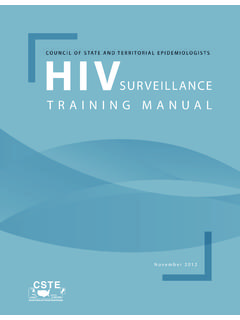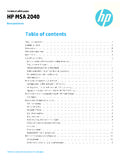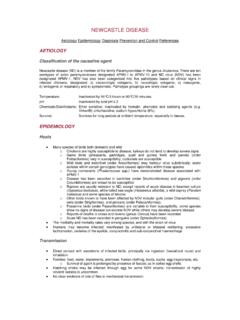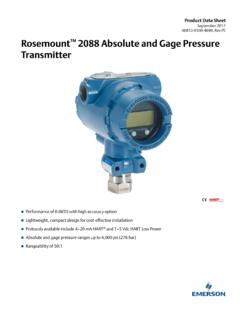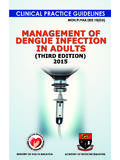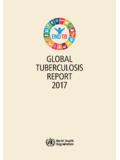Transcription of WHO Expert Committee on Biological …
1 WHO Technical Report Series980 Sixty-third reportWHO Expert Committeeon BiologicalStandardization980 WHO Expert Committee on Biological StandardizationWHO Technical Report SeriesThis report presents the recommendations of a WHO Expert Committee commissioned to coordinate activities leading to the adoption of international recommendations for the production and control of vaccines and other biologicals, and the establishment of international Biological reference a brief introduction, the report summarizes a number of general issues brought to the attention of the Committee . The next part of the report, of particular relevance to manufacturers and national regulatory authorities, outlines the discussions held on the development of revised WHO Recommendations and Guidelines for as number of vaccines, blood products and related substances.
2 Specific discussion areas included the development of WHO guidance on the quality, safety and efficacy of poliomyelitis vaccines; recombinant malaria vaccines; diphtheria vaccines; tetanus vaccines; combined vaccines based on diphtheria and tetanus vaccines; and Japanese encephalitis sections of the report then provide information on the current status and proposed development of international reference materials in the areas of vaccines and related substances; blood products and related substances; in vitro diagnostic device reagents; biotherapeutics other than blood products; and series of annexes are then presented which include an updated list of WHO Recommendations, Guidelines and other documents on Biological substances used in medicine (Annex 1), followed by a series of WHO Recommendations and Guidelines adopted on the advice of the Committee (Annexes 2 7).
3 All additions made during the meeting to the list of International Standards and Reference Reagents for Biological substances maintained by WHO are then summarized in Annex 8, and are also available at: Expert Committee on Biological StandardizationSixty-second Technical Report Series, No. 979, 2013 (xiii + 366 pages)WHO Expert Committee on Biological StandardizationSixty-first Technical Report Series, No. 978, 2013 (xi + 384 pages)WHO Expert Committee on Biological StandardizationSixtieth Technical Report Series, No. 977, 2013 (viii + 231 pages)WHO Expert Committee on Biological StandardizationFifty-ninth Technical Report Series, No. 964, 2012 (viii + 228 pages)WHO Expert Committee on Biological StandardizationFifty-eighth Technical Report Series, No.
4 963, 2011 (viii + 244 pages)WHO Expert Committee on Biological StandardizationFifty-seventh Technical Report Series, No. 962, 2011 (viii + 206 pages)Web site: WHO PUBLICATIONS OF RELATED INTERESTF urther information on these and other WHO publications can be obtained fromWHO Press, World Health Organization, 1211 Geneva 27, Switzerland(tel.: +41 22 791 3264; fax: +41 22 791 4857; e-mail: online: )The World Health Organization was established in 1948 as a specialized agency of the United Nations serving as the directing and coordinating authority for international health matters and public health. One of WHO s constitutional functions is to provide objective and reliable information and advice in the field of human health, a responsibility that it fulfils in part through its extensive programme of Organization seeks through its publications to support national health strategies and address the most pressing public health concerns of populations around the world.
5 To respond to the needs of Member States at all levels of development, WHO publishes practical manuals, handbooks and training material for specific categories of health workers; internationally applicable guidelines and standards; reviews and analyses of health policies, programmes and research; and state-of-the-art consensus reports that offer technical advice and recommendations for decision-makers. These books are closely tied to the Organization s priority activities, encompassing disease prevention and control, the development of equitable health systems based on primary health care, and health promotion for individuals and communities. Progress towards better health for all also demands the global dissemination and exchange of information that draws on the knowledge and experience of all WHO s Member countries and the collaboration of world leaders in public health and the biomedical ensure the widest possible availability of authoritative information and guidance on health matters, WHO secures the broad international distribution of its publications and encourages their translation and adaptation.
6 By helping to promote and protect health and prevent and control disease throughout the world, WHO s books contribute to achieving the Organization s principal objective the attainment by all people of the highest possible level of WHO Technical Report Series makes available the findings of various international groups of experts that provide WHO with the latest scientific and technical advice on a broad range of medical and public health subjects. Members of such Expert groups serve without remuneration in their personal capacities rather than as representatives of governments or other bodies; their views do not necessarily reflect the decisions or the stated policy of further information, please contact: WHO Press, World Health Organization, 20 avenue Appia, 1211 Geneva 27, Switzerland (tel.)
7 +41 22 791 3264; fax: +41 22 791 4857; e-mail: order online: ).WHO Technical Report Series980 WHO Expert Committeeon BiologicalStandardizationThis report contains the collective views of an international group of experts and does not necessarily represent the decisions or the stated policy of the World Health OrganizationSixty-third report World Health Organization 2014 All rights reserved. Publications of the World Health Organization are available on the WHO web site ( ) or can be purchased from WHO Press, World Health Organization, 20 Avenue Appia, 1211 Geneva 27, Switzerland (tel.: +41 22 791 3264; fax: +41 22 791 4857; e-mail: for permission to reproduce or translate WHO publications whether for sale or for noncommercial distribution should be addressed to WHO Press through the WHO web site ( ).
8 The designations employed and the presentation of the material in this publication do not imply the expression of any opinion whatsoever on the part of the World Health Organization concerning the legal status of any country, territory, city or area or of its authorities, or concerning the delimitation of its frontiers or boundaries. Dotted lines on maps represent approximate border lines for which there may not yet be full mention of specific companies or of certain manufacturers products does not imply that they are endorsed or recommended by the World Health Organization in preference to others of a similar nature that are not mentioned. Errors and omissions excepted, the names of proprietary products are distinguished by initial capital reasonable precautions have been taken by the World Health Organization to verify the information contained in this publication.
9 However, the published material is being distributed without warranty of any kind, either expressed or implied. The responsibility for the interpretation and use of the material lies with the reader. In no event shall the World Health Organization be liable for damages arising from its publication contains the collective views of an international group of experts and does not necessarily represent the decisions or the policies of the World Health in ItalyWHO Library Cataloguing-in-Publication DataWHO Expert Committee on Biological standardization , sixty-third report.(WHO technical report series ; no. 980)1. Biological products - standards. 2. Vaccines - standards. 3. Reference standards.
10 4. Guideline. Health Organization. Expert Committee on Biological standardization (2012: Geneva, Switzerland). 978 92 4 1209802 (NLM classification: QW 800) ISSN 0512-3054iiiContentsAbbreviations xi1. Introduction 12. General Current directions Strategic directions in Biological standardization : WHO priorities Vaccines and Biological therapeutics: recent and planned activities in Biological standardization Blood products and related in vitro diagnostics: recent and planned activities in Biological standardization Reports Report from the WHO Blood Regulators Network Report from the WHO collaborating centres for Biological standards Issues Scientific issues identified by custodians of WHO Biological reference preparations Issues shared with the WHO Expert Committee on Specifications for Pharmaceutical Preparations Feedback from other WHO committees Request from the Strategic Advisory Group of Experts (SAGE) on Immunization for guidance on off-label use of vaccines Request from the WHO Immunization Practices Advisory Committee (IPAC) to establish harmonized standards for the labelling of vaccines 133.











